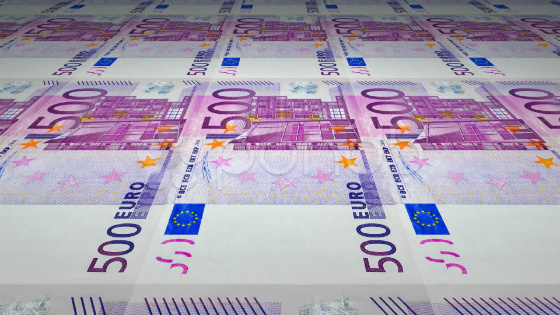Will the ECB discontinue the 500-euro note?
 Recently I attended a seminar on underground banking (for an explanation click here. It's in Dutch but I think it's also understandable for non-Dutch speakers). Among the many interesting things explained there, they also showed how easy it is to transfer large sums of cash money when you just use large denominations. For instance, when you use 500-euro notes, a pile of 100 notes totals 50,000 euro but is so small you can carry it in a envelope. A quarter of a million euros can be carried in a carton of milk.
Recently I attended a seminar on underground banking (for an explanation click here. It's in Dutch but I think it's also understandable for non-Dutch speakers). Among the many interesting things explained there, they also showed how easy it is to transfer large sums of cash money when you just use large denominations. For instance, when you use 500-euro notes, a pile of 100 notes totals 50,000 euro but is so small you can carry it in a envelope. A quarter of a million euros can be carried in a carton of milk.
It's precisely this reason why more and more people are calling for the abandonment of the 500-euro notes. In 2010, Britain's Serious Organised Crime Agency estimated that 90 percent of 500-euro banknotes sold from exchange bureaus in the country were in the hands of organized criminals. The European Central Bank has now indicated that it will indeed investigate if the 500-euro note has to be continued.
"From my point of view, the arguments in favour of keeping it are less and less convincing," [executive board member Benoit] Coeure said, but acknowledged that some people, "notably in Germany" were concerned about the disappearance of payments in cash. The €500 bills account for just 3% of the total number of banknotes in circulation, but 28% of the total value, according to ECB statistics. Any decision regarding their possible withdrawal would be taken by the ECB's governing council, the 25-member board comprising six executive board members and the 19 central bank governors of the member states.
The 500-euro banknote is one of the most valuable banknotes in the world. In 2014 Singapore decided that the then most valuable banknote in the world, its 10,000-dollar note, wouldn't be issued anymore. If the 500-euro would suffer the same faith, the soon to be issued 1,000-francs from Switzerland would be the most valuable note in the world.











No comments